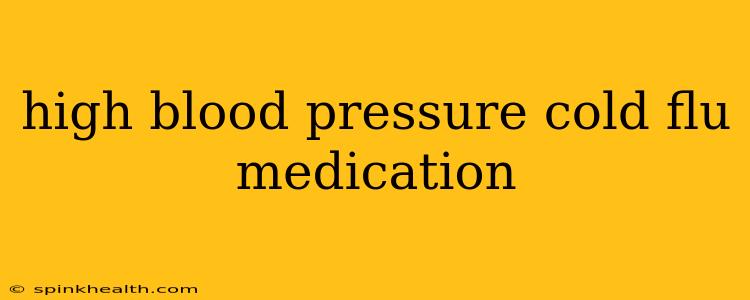Ah, the dreaded cold or flu. That scratchy throat, the aching head, the body wracked with chills... And if you're managing high blood pressure (hypertension), the experience can be even more complicated. Choosing the right over-the-counter (OTC) medication becomes a delicate balancing act. You need relief, but you also need to protect your heart health. This isn't a game of chance; let's explore how to navigate this common concern safely and effectively.
My name is Alex, and I've spent years researching health and wellness information. While I'm not a doctor, the information below is based on widely accepted medical knowledge and is intended for informational purposes only. Always consult your physician or pharmacist before starting any new medication, especially if you have pre-existing conditions like hypertension.
What Cold and Flu Medications Can I Take with High Blood Pressure?
This is the million-dollar question, isn't it? The answer, unfortunately, isn't a simple yes or no. Many common cold and flu remedies contain ingredients that can interact negatively with blood pressure medications or exacerbate existing hypertension.
The main culprits are often decongestants, like pseudoephedrine (Sudafed) and phenylephrine. These can raise your blood pressure, sometimes significantly. This interaction is particularly risky for those already experiencing hypertension or taking medication to manage it.
Pain relievers like ibuprofen (Advil, Motrin) and naproxen (Aleve) are generally considered safe for most individuals with high blood pressure, but it’s crucial to use them as directed and to be mindful of potential interactions with other medications you're taking. Always consult a pharmacist if unsure. Acetaminophen (Tylenol) is usually a safe alternative for pain and fever relief, typically causing no significant blood pressure fluctuation.
Expectorants, such as guaifenesin (Mucinex), generally pose minimal risk and can help loosen congestion.
Can Certain Cold Medications Raise Blood Pressure?
Yes, some cold and flu medications can indeed raise blood pressure. As mentioned earlier, decongestants are the primary offenders. These medications work by narrowing blood vessels, which can increase blood pressure. The effect can be amplified if you are already on medication to lower your blood pressure.
What Should I Do If I Have a Cold or Flu with High Blood Pressure?
First and foremost, consult your doctor or pharmacist. They can advise on the best course of action based on your specific medications and health history. They'll help you determine the safest and most effective remedies for your symptoms while considering your hypertension.
Until you can speak to a healthcare professional, prioritize rest, hydration, and a healthy diet. These are often the most effective remedies for cold and flu symptoms. Plenty of fluids help thin mucus, while rest allows your body to fight off the infection. Avoid alcohol and caffeine, as these can further elevate blood pressure.
If you decide to use an OTC medication, carefully read the label and pay close attention to the ingredients. Avoid products containing decongestants if possible.
Are There Any Cold Medicines That Are Safe for People with High Blood Pressure?
While no medication is universally "safe" without consultation with a doctor, some are generally considered lower risk than others. Acetaminophen (Tylenol) for pain and fever is often a good choice. Expectorants like guaifenesin (Mucinex) generally pose minimal risk. However, always check with your pharmacist or doctor before using any OTC medication.
What Are the Side Effects of Taking Cold Medicine with High Blood Pressure?
The primary concern is a further elevation of blood pressure. This could lead to various complications depending on the severity and the individual’s overall health, ranging from headaches and dizziness to more serious cardiovascular events. Other potential side effects could include increased heart rate, anxiety, and insomnia, particularly with decongestants.
Conclusion: Prioritize Safety and Consultation
Managing high blood pressure while battling a cold or flu requires careful consideration and proactive communication with your healthcare provider. Never self-medicate without consulting a doctor or pharmacist. Your health and safety are paramount. Remember, prioritizing rest, hydration, and a healthy diet will often provide significant relief. This information isn't a substitute for professional medical advice—always seek guidance from qualified healthcare professionals.

